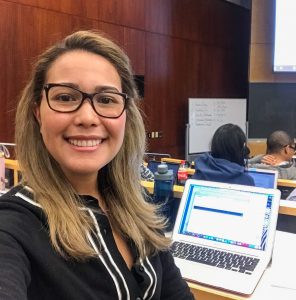by Rachel Cortes

It is an undeniable reality that transgender citizens suffer a lot of discrimination and are victims of multiple violations of their human rights, starting with being discriminated against if their name does not match their gender. Imagine this scenario: in the security checkpoint of airports, females are inspected by females, and males are inspected by males. What happens when the officer realizes that your passport says ‘James’ but your name is ‘Alicia’ and you look female? Who will make the inspection, a male or a female officer? Starting with that simple question, we can put ourselves in that position: how would it feel, being a female, to be inspected by a man in an airport?
One of the most satisfying experiences I have had in my Columbia LL.M. year so far has been working with the Name Change Project, which has consisted of engaging in the process of changing the legal names of transgender clients to new names that match their identity and their sexuality. I decided to work on this project because, although I’m a corporate lawyer, it’s a sensitive matter to me; transgender citizens are often discriminated against and marginalized whenever their names do not appear to match their gender. Thanks to this initiative, they can officially (and legally) be who they really are.
I learned about this project through the Columbia Law School Pro Bono Program, and worked directly with the Transgender Legal Defense & Education Fund and Sullivan & Cromwell. I had the opportunity to assist a transgender client in filing a petition to change her name to one that matched her appearance. I was involved in every step of the process, from drafting the engagement letter and the petition, to attending the hearing before the New York City Civil Court.
Article 1 of the Universal Declaration of Human Rights states: “All human beings are born free and equal in dignity and rights. They are endowed with reason and conscience and should act towards one another in a spirit of brotherhood.” However, the concept of dignity and morality may vary from country to country. In the United States, the First and Fourteenth Amendment guarantee equality of all citizens and freedom of expression – including expressing the person’s gender and/or sexual orientation.
In New York, legal name changes are approved by a Civil Court. The purpose of making this process judicial is that filing a petition demonstrates to the court that the name change is not for a nefarious purpose, such as to avoid debts or cover a criminal record. It’s important to point out that nothing in the Civil Rights Law permits a court to deny a name change petition on the ground that a petitioner is transgender.
It is important to point out that nations and international bodies must continue to advocate for the Human Rights of the LGBT community since, to this date, no multilateral international treaties have been signed advocating for the minority the transgender community represents. As a matter of fact, in the United States there are countless different approaches towards gender identity. For example, the disclosure of transgender transition in the identification documents of citizens varies from state to state, and some gender identities don’t even exist in certain states.
My experience with this work has been very transformative and out of my comfort zone. Working pro bono in Human Rights has also been a great break from the corporate world. I am very thankful for this opportunity to change individuals’ lives in such a personal way.
Rachel is an LL.M. student from the Dominican Republic. Her focus areas are Mergers & Acquisitions, Corporate Law and International Arbitration.